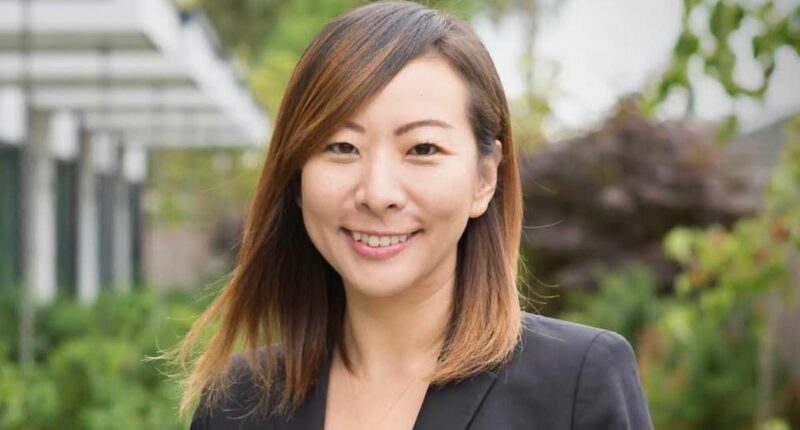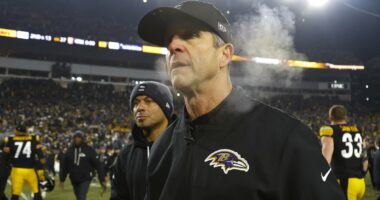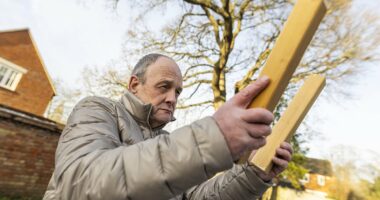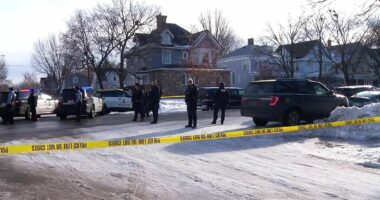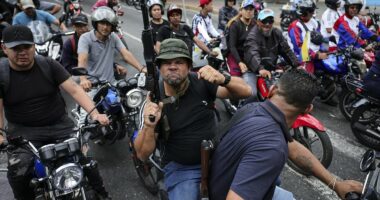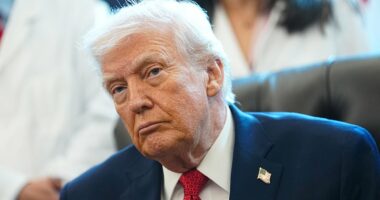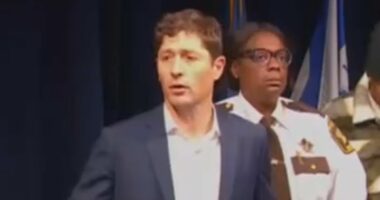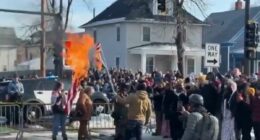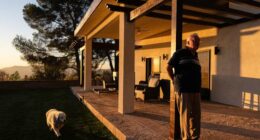Share this @internewscast.com
A former lawmaker advocating for the return of private land to Indigenous groups in Canada is now under pressure to give up her own properties.
In August, the Supreme Court of British Columbia granted the Cowichan Tribes Aboriginal title over approximately 800 acres of land in Richmond, a suburb of Vancouver.
Dallas Brodie, who leads the newly formed OneBC Party, recently put forward a bill aimed at banning land acknowledgments. However, the bill was rejected during its first reading on Thursday.
Following the vote, a celebratory embrace was shared between the BC Conservative House Leader and a member of the New Democratic Party’s legislative assembly.
The OneBC Party took to social media to denounce the embrace, criticizing the two for “rejoicing over the notion that Canada consists of stolen land.”
Katrina Chen, a former Member of the Legislative Assembly for Burnaby-Lougheed, responded to the OneBC Party’s comments, labeling them as “horrifying.”
She alleged the remark demonstrated a ‘complete lack of understanding of how colonialism has caused systemic inequities, entrenched racism, widespread injustice, and the loss of countless innocent lives.’
Chen’s reply was met with major criticism from some British Columbia residents who are now calling on the ex-lawmaker to ‘voluntarily register aboriginal title on the private properties that she owns.’

Katrina Chen, (pictured) who served as Member of the Legislative Assembly for Burnaby-Lougheed from 2017 to 2024, has been urged to relinquish her properties to the indigenous tribes of British Columbia, Canada

A disclosure statement from April 2024 revealed that Chen owns a residential property in the Vancouver suburb of Burnaby (file photo of Burnaby, British Columbia)
Chen, who describes herself as an ‘an immigrant from Taiwan now living on the unceded traditional territories of the Coast Salish Peoples,’ served as the Burnaby-Lougheed district MLA from 2017 to 2024.
Per Canadian law, as an assembly member, Chen was required to disclose all of her assets, liabilities and financial interests to the government.
A disclosure statement from April 2024 revealed that Chen owns a residential property in the Vancouver suburb of Burnaby.
She and a family member also co-own a residential property in Vancouver that was a source of rental income, the filing showed.
The same properties were also included on a disclosure statement from 2017.
Chen’s disclosure statements resurfaced over the weekend in wake of her defense of the aboriginal title ruling.
Canadians, however, have blasted her apparent hypocrisy and are urging the lawmaker to donate her own properties to the tribes.

Chen (pictured on the campaign trail in 2020) describes herself as an ‘an immigrant from Taiwan now living on the unceded traditional territories of the Coast Salish Peoples’. She seemingly supports the Aboriginal title ruling

A disclosure statement from April 2024 revealed that Chen owns a residential property in Burnaby. She also co-owns a rental property in Vancouver. The same properties were included on a disclosure statement from 2017
‘@KatrinaCHome put your money where you mouth is or keep it shut,’ one outraged X user wrote.
‘She should be the very first one to sign on,’ another replied.
One tweeted: ‘I don’t think she would, just another hippocrate (sic).’
‘Wouldn’t you know her bio says she lives on Occupied Turtle Island. She must be ready to give up her property,’ added another. ‘I wonder what she calls East Turkistan, Tibet, & Inner Mongolia. Occupied? Or nah? Just virtue signaling from an indignant scumbag?’
Although Chen’s properties are not located in the 800 acres awarded to the tribes, nearly all of British Columbia is unceded tribal land.
The Cowichan tribes have already filed an appeal claiming ownership of further land in the region, meaning Chen’s homes could potentially be included in a future handover.
The August 2025 ruling, which followed what has been billed the ‘longest trial in Canada’s history’, awarded the Cowichan ownership of an area the tribe calls the Lands of Tl’uqtinus.

The British Columbia Supreme Court in August awarded the Cowichan Tribes an Aboriginal title over roughly 800 acres of land in the Vancouver suburb of Richmond. The Cowichan tribes have already filed an appeal claiming ownership of further land in the region

Nearly all of British Columbia is unceded tribal land. Pictured is Vancouver, BC
The Lands of Tl’uqtinus refers to the traditional village site located along the Fraser River shoreline that was historically used for trade and fishing.
The area currently consists of land and buildings valued at more than $1.3billion, property analysts said.
The tribe was also given an Aboriginal right to fish for food, according to the court’s August 2025 ruling which was reviewed by the Daily Mail.
The ruling further declared that private ownership by the federal government and city of Richmond would be ‘defective and invalid.’
The declaration was suspended for 18 months so that the tribe, federal government and city would have the ‘opportunity to make the necessary arrangements.’
The so-called Lands of Tl’uqtinus is currently home to private residents, small farms, a golf course and several industrial operations.
The Cowichan tribes were displaced from the area in the mid-1800s when the British colonized the area.
British Columbia (BC) ultimately became a Canadian province and land in the historical Cowichen territory was sold over the years.

BC Conservative House Leader Aaliya Warbus and Brittny Anderson, the MLA for Kootenay Central and a member of the New Democratic Party, embrace after officials on Thursday voted down a bill to ban land acknowledgments

The OneBC Party took to social media to criticize Warbus and Anderson’s reactions, slamming the pair for ‘hugging each other in joy over the idea that Canada is stolen land.’ Chen then hit back at the party for its ‘horrifying comment.’
The tribe wanted to have ownership of the land returned to them, but did not seek for titles of privately held properties to be declared invalid.
The court, however, ruled that granting private property ownership rights would ‘unjustifiably infringe’ on Cowichan Aboriginal title, the August 2025 decision stated.
The court further ruled that issues surrounding titles would need to be resolved through negotiation, litigation or purchase, otherwise the properties would remain under Cowichan title lands.
The BC government and city of Richmond have filed a notice of appeal in the case.
